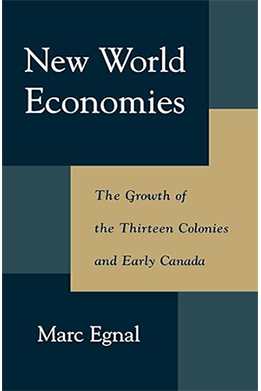
New World Economies
New World Economies offers a new, richly documented approach to the economic development of the Thirteen Colonies and early French Canada. The book argues that the pace and nature of growth in the colonies was tied tightly to the patterns of development in the parent countries.
Readers will find a treasure trove of material in the book’s seventeen tables and more than one hundred graphs.
This work is a companion to Egnal’s Divergent Paths, which offers a long-term perspective and explores the influence of culture and institutions on growth.
REVIEWS
“Drawing upon numerous quantitative and non-quantitative sources, Marc Egnal has presented an important analysis of the economic development in the thirteen colonies of British North America and in French Canada in the period before the American Revolution. With its detailed examination of major issues, New World Economies joins Egnal’s recent Divergent Paths as essential reading for understanding the causes and consequences of economic changes and their implications for broader political and cultural questions.”
-Stanley L. Engerman, University of Rochester
“A bright light on the darkest era of American economic history. This is an important and useful book, for its refinement of the existing theoretical frame, its wealth of empirical data, its breadth of context, and especially for its study of synchronic change in the Atlantic world of the eighteenth century. Marc Egnal is the master of this subject. We have much to learn from him.”
-David Hackett Fischer, Brandeis University
“New World Economies is a valuable addition to the body of literature about economic development in eighteenth-century North America, and a much-needed comparative study of the British and French colonies. The book is superbly written and contains a valuable array of charts, tables, and new time series on prices of specific exports and imports. It will be the starting point for any future research on the economic development of the British and French colonies in the eighteenth century.”
-Thomas Weiss, University of Kansas
“Within a relatively short compass Egnal provides considerable detail and comparative analysis…This book is stimulating and thought-provoking…”
–Choice.
